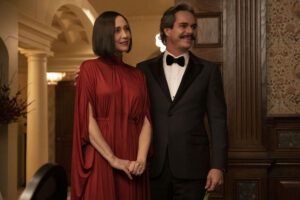SPOILERS FOR THE FIRST TWO EPISODES OF HAWKEYE AHEAD!
Even with the first two episodes released simultaneously this morning, Hawkeye is taking just a little bit longer to pick up speed than Marvel Studios’ last four Disney+ shows. It’s getting there, but the ending of episode two left me still waiting for that big “wow!” moment when the show would kick into gear – and disappointed that such a moment won’t arrive until next week at the earliest. If the series had more than six episodes to its first season, I wouldn’t be concerned, but now I wonder if Hawkeye will even have the time it needs to find its groove, much less stay in that groove long enough to make an impact.

In the meantime, Hawkeye takes us on a pleasing, if somewhat safe and slow-moving, joy-ride around the outskirts of the MCU’s criminal underworld. The series gets progressively more exciting as it ventures deeper into that dark and largely uncharted territory, although the trappings of Christmas in New York City are never far from sight, providing a visual contrast to all the violence and crime (in just the first episode, we have a murder and a musical number), and a pop of color that keeps the series from ever looking as blandly gritty as some of the Marvel Netflix shows that shared similar plots and street-level characters.
Hawkeye, a.k.a. Clint Barton (Jeremy Renner), is kind of a quintessential street-level character, as his enhanced accuracy and precision are superpowers grounded heavily in realism, that give him a slight advantage over your average criminal but don’t offer much if any protection from, say, Loki or Ultron or Thanos – the villains whom the Avengers took on, and whose low-level minions Hawkeye and Black Widow usually got saddled with killing. The Avengers movies were simply too epic in scale for Hawkeye’s bow and Black Widow’s batons to make much of a difference, so the writing emphasized their relatable qualities and made them out to be the team’s heart and soul, with Black Widow even sacrificing herself for the Soul Stone; taking the metaphor a step too far.
But sometimes all you need to do is reel it back a little for these characters to work. Not every hero needs to save the world every day – sometimes the most vividly-realized villains are those who threaten the hero on a more personal level, endangering them and their loved ones, challenging their worldview, or both. Because that gives us a reason to care, and it makes every injury sting a little fiercer. It’s not impossible to write a supervillain who checks those boxes, either, but the threat usually rings truer when it’s coming from someone grounded – like Echo (Alaqua Cox) who at least for now seems to be Clint’s primary antagonist in Hawkeye.
And we’re not even introduced to Echo until the end of episode two. Until then, Hawkeye is slowly working his way through her henchmen, a bunch of burly Eastern European men who call themselves the Tracksuit Mafia, and despite their ridiculous name (although, as Hailee Steinfeld’s Kate Bishop would be the first to admit, their branding is on-point), they’re more than a match for Hawkeye when he’s dispossessed of his bow and forced to rely on his limited mixed martial arts skills. We see him and Kate get hurt, repeatedly, and the show doesn’t gloss over those injuries like Black Widow did every time Natasha fell from some great height and miraculously walked off without so much as a scratch.
When Kate gets a nasty cut on the forehead, there’s an entire sequence devoted to properly cleaning her injury, in which Clint demonstrates those effortless mentoring skills that make him so popular with aspiring young superheroes. Clint knows the reality of what happens to average people who get entangled in Avengers business. By the time Hawkeye opens, two years after Avengers: Endgame, he’s already wearing his hearing-aid from the comics and using sign-language occasionally (the second MCU character to do so after Eternals‘ Makkari), which is explained as being the result of all those battles and loud explosions.
It’s easy to see why, in-universe more than in the real-world, regular folks look up to Hawkeye. He’s theoretically more accessible than any of the other main Avengers, whose ranks originally included a literal god, an ageless superhuman, a billionaire encased in high-tech armor, an enigmatic double-agent, and a man who did most of his work with the Avengers while trapped inside an uncontrollable green monster. Conversely, Clint is just a guy; but ironically, while that might seem to make him a better role model, Hawkeye plays with the idea that maybe…just maybe…we shouldn’t put any of these people on pedestals.
Clint is just a guy, but that means he’s also fallible. In his relatable mission to get back to his family, he’s always walked that thin line between doing what’s right and what’s best for him, demonstrating even less remorse about it than Black Widow. Sure, MCU fans love to defend him by saying that the victims of his serial killer spree in Endgame were all criminals, and maybe that’s true, but we still don’t know by what devious methods Clint acquired the Ronin mantle he used to commit those killings, and I’m inclined to believe that Echo might expose truths about him that nobody – least of all Hawkeye’s protégé Kate Bishop – wants to hear.

If Hawkeye continues down this path of deromanticizing the myth of the superhero, it could be revolutionary for the MCU. Kate Bishop in particular would come out the other side having learned some important lessons about the responsibility of heroes to wield their influence wisely, that would serve her well as she steps into a leadership role over the Young Avengers. I don’t know if the show will commit to this idea, because Disney absolutely still wants people to put the Avengers on pedestals and buy all their merchandise, but it’s nice to think about.
And even Kate is more morally gray than I expected. Not quite on the level of Hawkeye murdering people and leaving their bodies in the street, but the show doesn’t pretend that she hasn’t been spoiled all her life by her extraordinarily wealthy mother Eleanor Bishop (Vera Farmiga), who’s secured her a spot in a high-end college and a permanent job at Eleanor’s own security company. Tony Stark also benefited from mind-boggling wealth and nepotism, which the MCU simply never saw as a problem until after his death when The Falcon And The Winter Soldier raised the question of why he never paid the Avengers, but with Kate they could right those wrongs by actually addressing her privilege, and the ways it can be weaponized for good or evil.
We’ll see if the show chooses to double down on any of these themes, or if my reading is completely wrong in the end. What’s more certain is that, as was the case with WandaVision and The Falcon And The Winter Soldier and Loki, these first two episodes are seeded with clues regarding the season’s overarching mystery. There’s always more going on beneath the surface of these shows than what meets the eye at a first glance, and because these mysteries often lead circuitously back to characters that will be significant going forward, we’ve learned to pick up on these clues more quickly and to connect the dots.
Sometimes we’re still completely wrong, and the Mephisto debacle is a testament to what can happen when fans get so wrapped up in theories that they forget to focus on the show itself. But Hawkeye definitely wants us to know that someone relevant was behind the murder of Armand Duquesne (Simon Callow). While it might not have been his suave nephew Jack (Tony Dalton), their family history in the comics is shady nonetheless. Jack is better known as the Swordsman, an identity alluded to when Kate challenges him to a fencing duel in which he only pretends to be unskilled.
But if Jacques didn’t murder Armand, who did? Kate’s mother is a likely candidate. She had motive, surely, although we still don’t know exactly why Armand was threatening to call up his “powerful friends” to deal with her. Echo is another option, and Yelena Belova is supposed to appear in Hawkeye, although I have no idea why she’d want to kill Armand. The name that’s come up among fans is that of the Kingpin, the crime-lord who is Echo’s father figure in the comics and arguably the most prominent street-level villain. He has yet to appear in the MCU, although Vincent D’Onofrio memorably portrayed the role in Netflix’s Daredevil and there is some speculation that he may return to the role.
Thus far, we haven’t been given enough clues to build a compelling argument for or against any of these potential killers, and the murder mystery takes a backseat in episode two while Clint is off investigating the Tracksuit Mafia at a medieval-themed LARP (live-action roleplay) event that is a completely random and boring setting for a scene that drags on pointlessly. The slow pace of both these episodes is a problem, but Renner and Steinfeld have an easy chemistry that helps keep the momentum going, and Steinfeld at least sells all of her solo scenes (the same can’t be said of Renner, who is giving a strangely distant performance when we first reunite with him).

But with some assistance from an adorable dog that loves pizza, Renner and Steinfeld carry the first two episodes of Hawkeye through most of its rougher patches and hopefully won’t have to wait too long before the show finds its footing and rises to the level of Marvel Studios’ other Disney+ shows.
Episodes Rating: 7/10